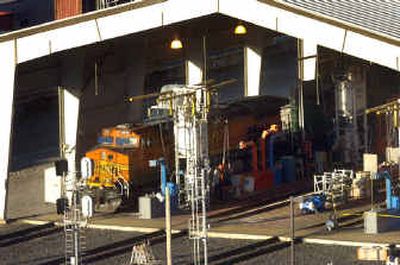BNSF says it will close depot within 24 hours

A Kootenai County judge on Wednesday ordered BNSF Railway Co. to clear the tracks at its refueling depot in Hauser, Idaho, within 24 hours.
The emergency closure order for the leak-plagued depot was signed about 3 p.m. by 1st District Judge Charles Hosack, who ruled that public health concerns outweighed a potential slowdown to interstate commerce.
The ruling came after state regulators requested a “timeout” for the high-speed refueling depot, where four petroleum leaks have recently been discovered. Before the facility can reopen, the railroad must repair holes in concrete and plastic containment barriers and provide evidence that the third and final underground fuel barrier remains intact, according to the temporary restraining order obtained by the Idaho Department of Environmental Quality.
“What we have out there is a system that has shown a propensity for problems,” Deputy Idaho Attorney General Garrick Baxter argued in a Coeur d’Alene courtroom Wednesday morning. “This is wholly unacceptable.”
Temporary restraining orders last 14 days, but both sides will return to court Wednesday at 9 a.m. to determine the future of the closure order. Rusty Robnett, an attorney for BNSF, said he did not know if the railroad would appeal the ruling before next week’s hearing. “I have to confer with my client,” he said, moments after the ruling was issued.
Later in the day, BNSF issued a statement that it would comply with the order, but made no mention of possible appeals.
Although the state asked for an immediate shutdown of the depot, the judge granted a railroad request for an additional 24 hours of operation. “There are trains that are in transit right now,” Robnett said. “We don’t want them running out of gas.”
The $42 million Hauser mainline fueling terminal, which opened in September, is the quickest fueling station on BNSF’s busy northern route, company spokesman Gus Melonas said Tuesday. BNSF has additional fueling terminals in Seattle, Pasco and Vancouver, Wash., as well as Havre, Mont.
The Hauser facility is capable of pouring 10,000 gallons of diesel into the tanks of a transcontinental train in less than 45 minutes, compared with the eight hours it can take to service a locomotive in the company’s cramped Seattle yard.
“It can add hours to this important corridor,” Melonas said. “We handle 60 trains daily across this northern line. Timing is critical to local, national and international customers.”
Closing the Hauser depot – even temporarily – could restrict interstate commerce, BNSF attorney Robnett argued in court Wednesday. And local judges don’t have the authority to stop the railroad. “This is totally a federal issue,” Robnett said.
Robnett argued there was “not a whit of evidence” that fuel had leaked through the second plastic barrier buried 10 feet under the refueling platform. Last week, BNSF reported that petroleum had leaked through the sealed concrete refueling platform, as well as at least one of two buried barriers. The company is conducting testing this week to determine if fuel has escaped containment, but two recent sets of soil samples have come up “bone dry,” Robnett said. “There is no evidence whatsoever that any material has escaped the bottom layer of containment.”
Robnett also said the buried containment barriers are designed to isolate leaks and the problems have been found only in one section.
State attorneys argued for additional proof that the third barrier is working. At least two holes have been found in the second barrier and cracks have been found in other areas on the concrete platform. The railroad has also dug large holes through the platform, but continues to refuel locomotives immediately adjacent to the holes, causing “grave concern” for state regulators, Baxter said.
“This in totality represents an imminent and substantial threat to the state of Idaho, to the citizens of Idaho and to the folks who drink the water,” Baxter said. “This is a water source that critically needs to be protected.”
Although Judge Hosack noted that issues of legal jurisdiction “quickly become a blurred area” in railroad cases, he said the situation at the depot constituted an “emergency.” The state has the power to intervene in such cases, he said.
The duty of the court is to prevent irreparable harm to the aquifer, Hosack said during a 20-minute explanation of his decision. “The situation here that we have is frankly an unknown.”
After the ruling, Kootenai Environmental Alliance director Barry Rosenberg was all smiles. “I’m real happy about this decision,” he said, with four TV cameras aimed his direction. “Now we need a completely independent evaluation on the integrity of that depot.”
Another longtime critic of the depot, Spokane water lawyer Rachael Paschal Osborn, thinks the court ruling could backfire for the state. On Wednesday, Osborn conducted a case study on the depot fight with a class she teaches at Gonzaga School of Law. When push comes to shove, federal interstate commerce laws typically trump state courts, Osborn said, citing a variety of recent federal cases.
“The law is just stacked against local jurisdictions,” she said. “I would not be surprised if Burlington Northern files an action in federal court in very short order.”
Such a battle could even result in the loss of special protections to the Spokane Valley-Rathdrum Prairie Aquifer afforded by the county-issued permit for the depot, Osborn said. “I’m afraid it’s going to be a temporary victory. The state may even end up losing ground.”